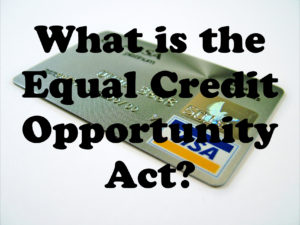By: Robert J. Nahoum
THE PROBLEM:
The use of consumer credit is everywhere in our society. People use credit and incur debt to pay for cars, homes, education and for every day needs. With such widespread use of credit, the United States Congress recognized that consumers seeking credit needed to be protected from discrimination on the basis of race, color, religion, national origin, sex, marital status age and the use of public assistance.  To provide such protection, Congress passed the Equal Credit Opportunity Act (ECOA).
THE RULES:
Under the ECOA, banks, lenders and other creditors may ask about your inclusion in a protected class based on race, religion, gender and marital status but they cannot not use those facts in determining whether to grant you credit or what the terms of such credit will be. However, neutral factors like income, expenses, debts, and credit history can be considered.
The ECOA covers entities or people who regularly extend credit, including banks, credit unions, small loan and finance companies, retail and department stores and credit card companies
When you apply for credit, lenders may not discourage you from applying or reject your application because of your race, color, religion, national origin, sex, marital status, age, or because you receive public assistance.
Lenders may also not impose different terms or conditions, like a higher interest rate or higher fees, on a loan based on your race, color, religion, national origin, sex, marital status, age, or because you receive public assistance.
Under the ECOA, you have the right to have credit in your birth name, your first and your spouse’s last name, or your first name and a combined last name. You also have the right to acquire credit without a cosigner including a spouse, if you meet the creditor’s normal standards.
If you are rejected for credit, under the ECOA the lender has to be transparent about the reasons for the rejection. You must be notified whether your application was accepted or rejected within 30 days of filing a complete application and if it was rejected the lender must tell you the specific reason for the rejection or that you are entitled to learn the reason if you ask within 60 days.
WHAT YOU SHOULD DO:
If you suspect a creditor has discriminated against you, call a qualified competent consumer attorney to discuss your rights and your options.  The ECOA includes a private right of which empowers you to sue the creditor in federal district court.  If you win, you can recover your actual damages and be awarded punitive damages if the court finds that the creditor’s conduct was willful.  You also may recover reasonable lawyers’ fees and court costs.
If you need help with a consumer protection issue, contact us today to see what we can do for you.
The Law Offices of Robert J. Nahoum, P.C
(845) 232-0202
www.nahoumlaw.com
info@nahoumlaw.com

